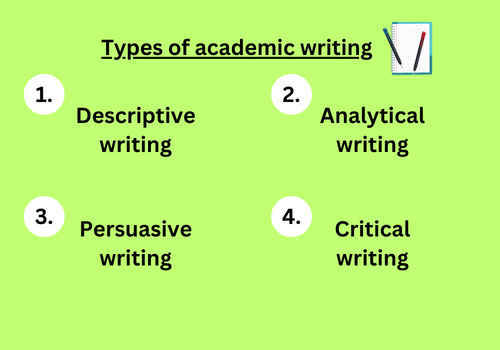Academic Writing: Definition, Types, And Tips
August 08, 2023
Anis

If you are considering attending college or university after high school, you should know a few things about academic writing.
How you write in college is different from what you were used to in high school.
Back then, you probably wrote short essays, but in college, you will have to write many more pages on a single topic.
It can be a bit of a shock, and you might make some common mistakes.
But don't worry!
In this article, you will learn some tips to avoid those mistakes and become a pro at academic writing.
Keep reading to find out more!
What Is Academic Writing?

Image source: iStock
When it comes to writing academic papers, it is vital to adhere to a formal style known as academic writing.
This style is widely used in journal articles and books about educational topics and is also expected for essays, research papers, and dissertations.
Academic writing involves the same writing process as other types of writing.
But it also requires adhering to specific content, structure, and style conventions.
For example, research papers are comprehensive academic documents presenting the findings, analysis, and interpretations of original research on a specific topic.
They are longer and more detailed than academic essays and are intended to evaluate writing and scholarly research skills.
On the other hand, dissertations are lengthy pieces of academic writing.
It is based on original research and is usually submitted as the completion step for a Ph.D. program.
Writing a dissertation necessitates strong research, writing, and analysis skills. It can be a challenging task.
Nevertheless, with practice and guidance from a lecturer, you can excel in academic writing.
Types of Academic Writing
1. Descriptive writing
Descriptive writing is a widely-used and straightforward type of academic writing.
This type of writing is often utilized for theoretical projects.
Its main objective is to present factual information and impart knowledge to the reader.
You are likely dealing with descriptive academic writing if you encounter words such as report, summary, record, or identify in an educational context.
2. Analytical writing
In the academic field, analytical writing is a frequently used type of writing.
When working on an academic study, more than just descriptive writing is required.
It would be best to use multiple writing styles to convey your message to your intended audience effectively.
It organizes your information in a way that helps your readers understand the content better.
In addition to presenting facts and data, you must explain how they relate.
For analytical writing, you need to pay attention to words like "analyze," "compare," "contrast," "examine," and "relate."
Plan your data and information before you start writing to improve your analytical writing skills.
Understanding the relationships between different factors is important before grouping them.
Additionally, dedicate one paragraph or section to each analytical category.
And don't forget to include a clear and concise introduction.
3. Persuasive writing
Persuasive writing involves using your opinion, facts, and information to create a compelling argument.
This type of writing includes analytical writing, with the addition of your personal interpretation, recommendation, or evaluation of the facts.
Also, you can use persuasive words such as "evaluate," "argue," and "discuss" to make your point in academic writing.
4. Critical writing
Critical writing is an advanced form commonly used in research, dissertations, reviews, and critical analysis.
It involves going beyond expressing personal opinions and requires considering and discussing other perspectives.
For instance, in research works, it's common for researchers to examine existing research and opinions before presenting their own.
To demonstrate critical writing, it's important to use phrases such as "evaluate," "debate," "critique," and "disagree."
8 Academic Writing Tips
Avoid using contractions

In formal academic writing, a question often arises is whether or not to use contractions.
Contractions are formed by combining or omitting syllables from two words, like "aren't," "don't," and "can't."
However, it's recommended to avoid using contractions in formal academic essays.
While contractions may be suitable for casual conversation, they should be excluded from essays to maintain a formal tone.
2. Avoid using colloquialisms and informal vocab
It is highly advisable to avoid informal words or colloquialisms to ensure your essay is easily understandable and coherent.
These words are commonly used in everyday conversations but may not be appropriate for academic writing.
Examples of such words include "super," "totally," and "heaps."
Additionally, avoiding slang or abbreviations in your academic essay is important.
They can change the overall tone of your thesis.
3. Use proper and academic words
It's important to include academic vocabulary to make your essay more persuasive.
Avoid using commonly used words such as "think," "use," and "lots" as they don't sound scholarly.
Instead, opt for descriptive words (such as "highlight" and "emphasize") that effectively convey your ideas in the introduction, body, and conclusion.
By structuring your essay well, you'll be able to impress your reader and achieve success in your literary essay.
4. Write a thesis statement
When writing an academic essay, it is crucial to express your argument clearly and straightforwardly.
Using plain language in your thesis or argument can persuade your reader.
Create a well-organized essay plan with structured paragraphs and sections to achieve this.
Start with an introduction that contains a thesis statement.
A thesis statement is a sentence that summarizes the main point of your paper or essay.
Below is an example of a thesis statement that I used to write during my university days;
Hence, this paper will examine in-depth language difficulties that are different from the younger and older generation in Malaysia due to the colonization by the British in Tanah Melayu, frequent usage of social media in everyday activities, and pressure received by one's close peers.
It typically appears towards the end of the introduction.
Your thesis will differ depending on the essay type, but it should always clearly state the main idea you wish to convey.
Ensure that all other parts of your essay are related to this idea.
During proofreading, double-check your work to guarantee that you've addressed the thesis statement.
5. Use the right point of view (No "I")

During high school, teachers often require their students to write in the first-person point of view.
For example, if a question asks students to compare two items, they would express their opinion by stating, "In my opinion, item A is superior to item B because..."
However, that's not how academic writing works. In academic writing, you have to use a third-person point of view.
It not only helps to maintain an objective tone. But it also creates distance between the writer and the subject matter.
It is crucial in research writing, where presenting new studies often requires quotations, statistics, and data without bogging down the language.
Utilizing the third-person POV, they streamline their writing, making it more direct and powerful.
As for that, I will share a short piece of my academic writing to demonstrate the usage of third-person POV:
As mentioned by Hirsch (2020) in her paperwork, "The great thing about language though, is that it waits for no one. While calls to decolonise curricula – and weather – seem likely to continue falling on deaf ears, culture moves on" (para. 7). Her astounding wordings define despite a person from a variety of racial background, the national language must be implemented in his usual activity.
6. Apply topic sentences and transition
For your academic essay to be more organized and understandable, starting each paragraph with a topic sentence is vital.
This sentence should outline the main idea or concept of the paragraph.
Additionally, transition sentences are important in making your paper flow seamlessly from one idea to another within a paragraph.
When you are revising your thesis, make sure to check that you have a topic sentence and that your transitions are smooth.
7. Follow the formatting guidelines
Make sure to confirm the formatting guidelines with your lecturer or supervisor.
The choice of font, font size, and line spacing can vary depending on the assessment requirements.
8. Use the right academic reference
When writing an essay, using the appropriate academic referencing style is important.
The choice of referencing style will depend on the type of essay being written or the preference of the individual who will be grading it.
Using the right referencing style is crucial, as it enhances the academic feel and tone of the essay.
To get more educational information, you can visit our site here.
Kickstart your education in Malaysia
We'll help you find and apply for your dream university
You might be interested in...
- Promoting Health and Well-being: Initiatives by Universities in Malaysia
- Raising Awareness of Microplastic Pollution on International Mother Earth Day
- Exploring Distance Learning: Course Offerings at Universities in Malaysia
- The Role of Education in Promoting Health Equity: Lessons from World Health Day 2024
- Navigating Credit Transfers: A Guide for Students Switching Institutions
- Explore the Benefits of Studying in Malaysia After SPM Examination
- SPM Leavers’ Guide to Malaysian Scholarships: Types, General Requirements, and Practical Tips
- Crafting a Greener Tomorrow: Empowering Change through Zero Waste and Upcycling Practices
- Malaysian Higher Education's Global Outreach: Collaborations with International Institutions
- Initiatives by Universities in Malaysia to Prepare Students for Globalization









